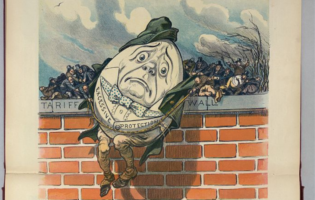The United States Economy after the 2012 Election: Playing Chicken

Stephen Silvia
American University
Dr. Stephen Silvia is a Geoeconomics Non-Resident Senior Fellow at AICGS. He is a Professor of Economics in the School of International Service at American University, where he teaches international economics, international relations and comparative politics. He researches comparative labor employment relations, and comparative economic policy, with a focus on Germany and the United States.
American elections are many things. One thing they rarely produce, however, is a deep and detailed discussion of policy proposals. This is particularly true for economic policy. In 2012, both presidential candidates have gone to great lengths to avoid discussing what they would actually do if elected because each is likely to engage in a high-stakes game of chicken, since this would not endear them to the voters, particularly the few remaining undecided ones at the middle of the political spectrum. Awareness of how this high-stakes game would unfold in an Obama or a Romney administration is essential to understanding the direction of the United States and the world economy in the coming years. The economic path the country takes will differ substantially, depending on which man wins the presidency.
Still, the game the next president will play, regardless of who wins, is chicken—because the American economy is hurtling toward what Federal Reserve Board Chair Ben Bernanke has dubbed, “The fiscal cliff.” The fiscal cliff is the combination of tax increases and spending cuts set to go into effect on 1 January 2013. The tax hikes, which come to the equivalent of 2.7 percent of the gross domestic product in 2013, result mainly from the expiration of the income tax cuts that George W. Bush instituted in 2001 and the temporary reduction in payroll taxes that the Obama administration championed in 2010. The spending cuts, which amount to 0.5 percent of GDP in 2013, are the product of the “sequestrations” prescribed in the 2011 Budget Control Act. Sequestrations totaling $1.2 trillion over nine years would fall across the board because the so-called “super committee” of Democrats and Republicans was unable to reach a budget agreement. The 2011 Act does spare the social security public pension system, Medicaid health care for those with low incomes, and civil and military employee pay from cuts. It also caps reductions of the Medicare health program for the elderly at 2 percent. Bernanke called this convergence of tax increases and budget cuts a cliff because if they were to happen, they would trigger a new economic recession.
The fiscal cliff places Barack Obama in a relatively strong political negotiating position, were he to be reelected. If Obama were to do nothing—which some observers have dubbed the Thelma and Louise strategy because of the famous 1991 movie by that name, which ends with the two heroines driving off a cliff to avoid capture by the police—he would accomplish two objectives that entertain considerable support in Democratic Party circles. He would end the Bush-era tax cuts and he could achieve a large measure of fiscal consolidation along lines that match the preferences of most Democratic voters: defense spending would be curtailed, but social programs would be largely spared. For Republicans, in contrast, there are no benefits to driving off the fiscal cliff, save for undertaking painful fiscal consolidation when the other party holds the presidency (which is likely to produce an economic downturn for which he then can be blamed) and the rhetorical opportunity to denounce Democrats for increasing taxes and cutting defense.
Given the asymmetrical advantages for the Democrats, a second Obama administration is in a good position to play hardball in any negotiations during the lame duck session of Congress, which will begin after the November election and is likely to run into early January of next year. He might even allow the tax increases and budget cuts to come into force on January 1 if the Republicans in Congress refuse to budge on tax increases. Some Republicans have expressed doubt that Obama would remain firm regarding the expiration of the Bush-era tax cuts. After all, he ultimately gave in during the 2010 budget talks. This time is different, however. Obama would not have to run for reelection, so he would no longer need to fear the consequences of alienating middle class voters. The Obama administration could also manage the budget cuts so as to minimize the pain they inflict at the outset.
Taking a hardline position would also aggravate a fault line within the Republican Party, a bonus for Democrats. Staunch Tea Party anti-tax proponents would insist on no tax increases whatsoever in talks with the Obama administration, even if it meant accepting a Thelma and Louise outcome for the economy in the short run. Pro-defense Republicans, however, would be willing to accept some tax increases as the price to pay for avoiding substantial defense cuts. Obama could forge a minimum winning coalition with the latter group that would trim entitlements at the edges (e.g., increasing the eligibility age for Medicare to 67), but use substantial tax increases on families earning more than $250,000 per year as the main vehicle for achieving fiscal consolidation. Intense fire from the defense sector and other private sector businesses dependent on government contracts would most likely break down the Tea Party lines. The resulting compromise would force hundreds of Congressional Republicans to renege on Grover Nordquist’s no-tax pledge, which they had signed. Democrats would have effectively defanged the tax issue. A compromise that eliminates a significant share of the sequestrations would also restore a sufficient amount of domestic demand to stave off a severe downturn. The end result would be game, set and match to Obama.
If Mitt Romney were to prevail on November 6, the outcome would be quite different. Romney has given all indications that he intends to push Paul Ryan’s 2012 budget proposal as the centerpiece of his economic policy. Passing the Ryan budget would be easier than first meets the eye, even if Senate Democratic leadership passes from the ineffectual Harry Reid to the pugnacious but effective Charles Schumer and the Democrats hold on to a majority in the Senate. Ryan’s budget calls for a sizable drop in income tax rates, increased defense spending, large cuts in social programs, and the eventual conversion of Medicare for people currently younger than fifty-five into a voucher program.
Paul Ryan has carefully crafted his budget to avoid a filibuster by limiting its content to items that fall under the budget reconciliation procedures in the Senate, which only require a simple majority for passage. Even if the Republicans fall short of capturing the Senate, all they will need is two or three wayward Democrats to reach a working majority. In the past, both Bushes and Ronald Reagan had little trouble finding a handful of pliant Democrats in swing states who were willing to play ball. Although the picking has become thinner as the country has become more ideologically polarized over the past few decades, Romney and Ryan are likely to meet with similar success.
Romney and Ryan have also talked about restoring fiscal balance on the campaign trail, but nothing in their program points to it as an actual priority if they were to be elected. In fact, the lack of fiscal probity would be one of the most important political advantages for selling the budget to wavering Senate Democrats. Republicans could frame the Ryan budget to Democrats as a stimulus package and Democrats who back the budget could even point to it not balancing as proof of a concession that they wrung out of Romney and Ryan in exchange for their votes. This was a part of Ronald Reagan’s strategy in the 1980s and it could very easily work again three decades later.
Still, both the Obama and Romney scenarios portrayed above have internal contradictions and entail considerable risk. If Obama were to play hardball and the Republicans remain stalwart, he would risk triggering a second severe recession only four years after the financial crisis. This would have a worldwide impact and seal the image of Obama as a poor economic steward in the minds of most Americans. If Romney successfully pushes through the Ryan budget, he would risk further credit downgrades, bringing an end to the private sector’s willingness to lend to the United States at low interest rates. Romney would also alienate deficit hawks within the Republican Party.
Turning from the budget to U.S. international economic policy, the picture looks remarkably different. In stark contrast to the sharply contrasting policies each candidate offers for the domestic economic agenda, there are likely to be few significant differences in international economic policy between an Obama and a Romney administration.
Romney trod the trail first blazed by Bill Clinton as a presidential candidate when it comes to relations with China. Everyone has followed Clinton’s example by criticizing the incumbent president for having been “too soft” on China, but once in office, they have pursued a more moderate course. On the campaign trail, Romney has sworn to declare China a currency manipulator on his first day in office. The United States has done this before. In 1992, 1993, and 1994, the U.S. officially accused China of currency manipulation. U.S. law requires an administration to open negotiations with the offending country whenever it makes such a declaration, but it mandates no other action. The talks during the mid-1990s regarding currency manipulation went nowhere and ended with no resolution. New talks on the topic would likely suffer the same fate. A second Obama administration would most likely not declare China a currency manipulator, but it would continue to use the World Trade Organization’s dispute settlement mechanism to curb China’s most egregious trade practices. A Romney administration would be no less aggressive at the WTO.
A President Romney would most likely pursue a position similar to that of the Obama administration regarding the euro, namely, political encouragement for deeper European integration as part of a solution to the crisis, but no material support to help stabilize the currency. A Romney administration would probably express greater sympathy than the Obama administration for the austerity policies Germany advocates, but only to a point, and would be critical of excessive austerity that crippled Europe as a trading partner.
Both an Obama and a Romney administration would pursue regional trade talks with the approximately same vigor and would face the same obstacles. Barack Obama is the first president since the passage of the Trade Act of 1974 not to obtain “fast-track” authority (a.k.a., trade promotion authority) from Congress to facilitate the passage of trade agreements. The expected narrowing of the Republican majority in the House and the Democratic majority in the Senate makes passage of fast-track authority in the next four years even more challenging than in the previous four. Progress on trade liberalization will still be possible, however. The Obama administration was able to move free trade agreements with Colombia, Panama, and South Korea through Congress using normal legislative procedures. These agreements were actually holdovers for which the Bush administration was unable to secure passage. Obama was more judicious during his first term than his predecessor in opening new trade talks. The Obama administration has demonstrated a preference for regional over bilateral agreements. The next administration will continue to negotiate the Trans-Pacific Partnership (TPP) regional trade area begun by Obama and is likely to advance talks to move a Transatlantic Economic Partnership (TEP) from the pre-negotiation to negotiation phase.
Fixing the machinery for multilateral trade negotiations will also be on the agenda of the next administration, but it will remain a secondary concern. To be sure, the deadlocked Doha Development Agenda has been an embarrassment for all World Trade Organization members, but no major player has been willing to expend the political capital required to break the impasse. The Romney campaign has offered nothing new or innovative regarding the WTO. Its approach would most likely differ little from that of a second Obama administration.
In summary, American economic policy is a study in contrasts. Partisan confrontation over domestic economic policy is going to get even more heated immediately after the November election, but it is likely that gridlock will come to an end regardless of who is the next president. Each outcome contains risks. President Obama would take the country back toward fiscal balance, but at the risk of a second crippling recession. Governor Romney may avoid an economic downturn but offers little prospect of closing the budget gap. Foreign economic policy, however, is unlikely to change much in coming years.









